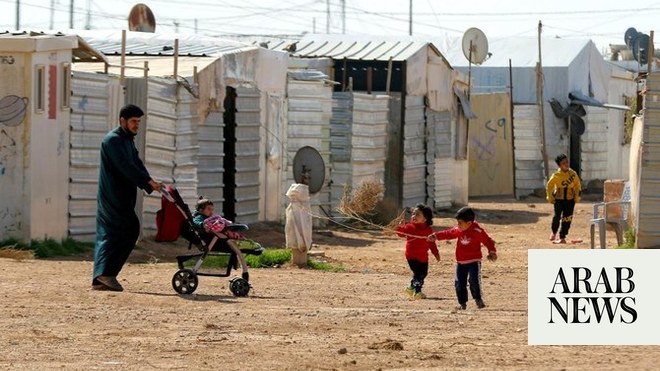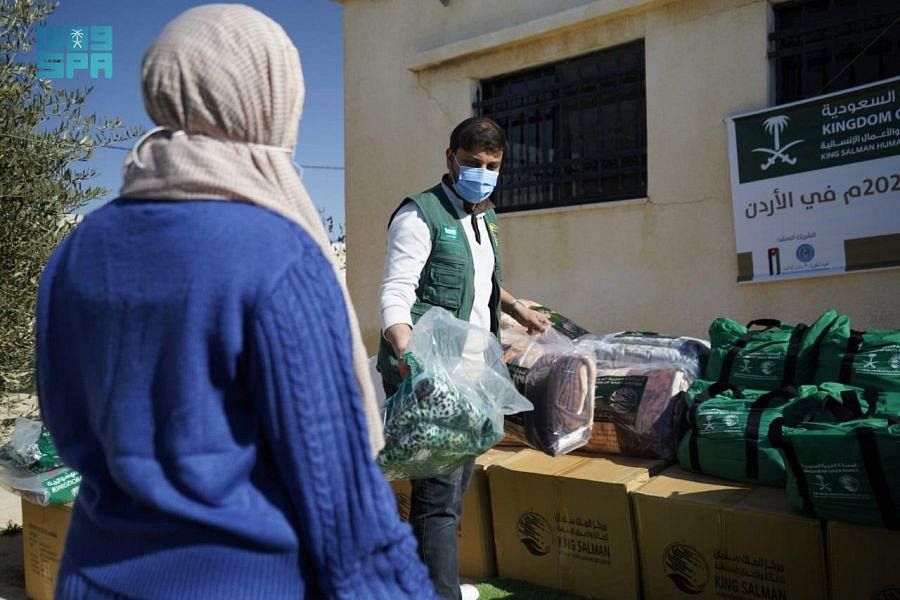
Current lack of funding undermining great achievements made in over a decade, UNHCR representative says
‘Determined and coordinated action needed to keep success story alive,’ aid official claims
AMMAN: The UNHCR has warned of “serious consequences” for refugees in Jordan if no adequate funding is added to its shrinking budget.
The UN refugee agency has issued a recent appeal calling for “immediate” assistance after other agencies announced plans to reduce health services and food help in camps in Jordan.
Jordanian government-owned Al-Mamlakah TV commented on a UNHCR report which said that the UN refugee agency had only received 32 percent of its financial needs for 2023, or “$125.7 million of its annual budget of $390.11 million.”
In light of this 68 percent deficit, Dominik Bartsch, the agency’s representative to Jordan, has warned of a “humanitarian crisis and serious consequences for refugees and host communities.”
He added: “The current lack of funding for the refugee response is undermining the great achievements made in over a decade.”
Now, there is an imminent risk that the situation is sliding back into a humanitarian crisis, with serious consequences for refugees and host communities.
Dominik Bartsch, UNHCR’s representative to Jordan
He said that there was growing concern that Jordan’s ability to include refugees in healthcare and education systems might be eroded.
“Sustained support over the years has allowed Syrian refugees to access the labor market,” Bartsch said.
“Now, there is an imminent risk that the situation is sliding back into a humanitarian crisis, with serious consequences for refugees and host communities.”
Bartsch praised Jordanian efforts in past years in giving assistance to refugees.
The country issued a record 62,000 work permits to Syrians in 2021, according to UNHCR.
This was a result of the international community committing funding and expanded trade facilitation under the Jordan Compact, an initiative to improve access to education and legal employment for Syrians forced to flee their homes.
Bartsch added: “Jordan has done so much, and donors need to recognize what is at risk.”
He called for a “determined and coordinated action … to keep the success story in Jordan alive.”
Bartsch said that the lack of assistance was exacerbating the vulnerability of refugees.
He added: “The number of refugee families who cannot pay their rent and are at risk of eviction from their homes rose by 66 percent from December 2022 to February 2023.”
The representative warned of another wave of refugees toward Europe should no “immediate action” be taken to improve their financial situation in Jordan.
He said: “Another consequence of lack of assistance is that it may push refugees onto irregular routes toward Europe. UNHCR is concerned about their protection after leaving Jordan as they are exposed to exploitation, abuse, and death.
“The recent shipwreck off Greece was a stark reminder that people who do not see a perspective, make desperate choices.”
The World Food Programme has recently announced a reduction of the value of its monthly food assistance for refugees in Jordan’s refugee camps, from around $32 to $21.
The UNHCR has said that a number of nongovernmental organizations providing health services have left Zaatari and Azraq camps in Jordan, leading to serious shortages and quality issues of remaining facilities.
Jordan has said it is providing refuge to about 1.3 million Syrians, including some 670,000 officially registered with the UNHCR as refugees, making the kingdom host to the world’s second-largest population of Syrian refugees per capita after Lebanon.
Turkiye has accepted 3.6 million Syrian refugees, while Lebanon hosts almost 1 million, according to the UNHCR.
Jordan hosts the Zaatari camp, the largest in the Middle East, and the Azraq camp. Most Syrians in Jordan live in cities and urban centers, however, where they work in certain industries.
While Jordan has been stepping up efforts for a voluntary return of Syrian refugees, a recent UNHCR study found that only 0.8 percent of them are willing to go back home.
The survey revealed that around 97 percent of Syrian refugees in Jordan have no intention of returning home in the next 12 months due to security and economic concerns, including a lack of housing and basic amenities in Syria.
Jordan has announced that it has begun coordinating with the Syrian government and relevant UN organizations to facilitate the voluntary return of some 1,000 Syrian refugees.
The decision was announced on May 1 following a landmark meeting in Amman of foreign ministers from Saudi Arabia, Egypt, Iraq, and Jordan. Syrian Foreign Minister Faisal Mekdad also attended.












